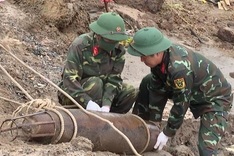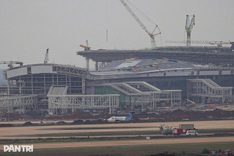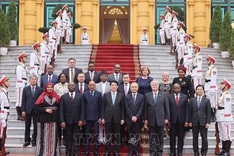
An overview of the Government meeting on inflation control
The National Assembly in its year-end session last November passed a resolution relating to major socio-economic development indicators for 2024, in which Vietnam would achieve GDP growth at between 6% to 6.5% and control inflation at between 4% to 4.5%.
The past five months has witnessed the country continue to maintain macroeconomic stability, control core inflation, and guarantee major balances. Most notably, its public debt, Government debt, and foreign debt were under control. Many global institutions therefore remain optimistic, projecting the country’s GDP growth at over 6%.
Statistics indicate that the consumer price index (CPI) for May rose by 0.05% month on month and 4.44% year on year, the highest rate recorded since January 2023, that is bringing to bear pressure on inflation. Consequently, the CPI fueled five-month core inflation to edge up by 2.78% compared to the same period last year.
Though the five-month core inflation remains under control compared to the average target of 4.0% to 4.5% this year, elite Government members pointed out at the meeting that the macro economy and inflation will continue to be under pressure over the coming months due to complex and unpredictable developments occurring around the world.
Furthermore, policy adjustments of major economies that have economic relations with Vietnam, along with recent unhealthy developments in the currency and gold markets locally, are impacting the national economy, requiring both viable solutions and great efforts to be made in a bid to achieve the set target.
Contemplating all factors, PM Chinh emphasised the flexibility in execution, close policy co-ordination, and feasible measures that need to be taken to remove all bottlenecks.
He therefore requested that relevant ministries and agencies continue to operate the monetary and financial policy proactively, flexibly, promptly, and effectively; and move to create favourable conditions for businesses and people to gain access to credit capital.
According to the PM, it can be considered imperative to drastically deploy solutions as a way of stabilising market prices to control inflation by providing an abundant supply of commodities, especially essential goods such as petrol and oil, housing and food, textbooks, and medical examination and treatment services.
He asked ministries and agencies to focus on renewing the traditional growth drivers of investment, export, and consumption; and strongly promoting new ones such as regional linkages, the digital economy, the green economy, the circular economy, and innovation; along with new industries and fields such as semiconductor chips and artificial intelligence.
The PM underscored the need to further promote the disbursement of public investment capital whilst promptly handling difficulties and obstacles to speed up the progress of key national infrastructure projects.
Among other things, the Government leader requested further streamlining administrative procedures; reducing taxes, fees, and charges; ensuring adequate electricity supply; completing a direct power purchase agreement mechanism; seizing opportunities from free trade agreements; and developing tourism services.




















